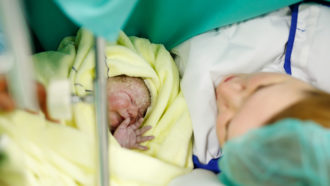Children born by Caesarean.
area might lose out on much of mama’s valuable gut microorganisms. Rather, these babies’.
guts harbor more germs that typically hide in medical facility spaces, researchers.
discovered.
The finding, explained September 18 in Nature, includes weight to the concept that C-sections, and the prescription antibiotics that typically include the treatment, might alter the kind of germs that initially reside in a newborn’s gut This collection of microorganisms assists form the microbiome, and information of this early colonization may be essential for long-lasting health, some researchers presume.
Still, the outcomes should not.
discourage ladies from getting C-sections if required. “Caesarean areas are a.
life-saving and clinically required intervention,” states Lisa Stinson, a.
molecular microbiologist and reproductive biologist of the University of.
Western Australia in Perth. However “we require a much better understanding of their.
long-lasting results on babies.”
Microbiome imbalances have.
been connected to conditions such as asthma, allergic reactions.
and other inflammatory illness ( SN:.
2/17/17). However researchers do not understand whether an infant’s nascent microbiome could.
eventually affect these conditions. Nor is it clear whether birth information.
modification that early microbial colonization.
To get a photo of these.
early bacterial minutes, genomicist Yan Shao of the Wellcome Sanger Institute.
in Cambridge, England, and associates studied the gut germs residing in596
full-term, healthy infants born in U.K. medical facilities. In the 314 infants born.
vaginally, valuable gut microorganisms such as Bifidobacterium
and Bacteroides comprised 68 percent on.
average of the overall gut germs. These germs were scarcer in the guts of.
infants born by C-section. Rather, types typically discovered in medical facility settings,.
consisting of possibly damaging Enterococcus and Clostridium, represented.
approximately 68 percent of the overall gut germs.
Remarkably, neither group.
of infants had much germs from their moms’ vaginal areas, a lack that calls.
into concern the effectiveness of providing vaginal microorganisms to babies ( SN:.
3/30/16). Smearing vaginal fluids onto infants born through C-section has actually been studied.
as a method to bring back typical gut microbiota. However the brand-new research study “discovered no proof.
to support questionable ‘vaginal swabbing’ practices,” Shao states.
Together with the birth mode.
itself, prescription antibiotics provided throughout birth likewise shape which germs establish.
store in a baby’s gut, the research study recommends. In numerous locations, moms who.
go through C-sections get prescription antibiotics to avoid infections. Together with.
getting rid of prospective dangers, these drugs can eliminate valuable germs. In the.
research study, infants born vaginally however whose moms likewise took prescription antibiotics had less.
valuable Bacteroides germs. That.
recommends that a few of the bacterial distinctions are “associated.
to maternal antibiotic direct exposure–.
not absence of direct exposure to vaginal germs at birth,” Stinson states.
Prescription antibiotics might likewise impact the microbial mixes in moms’.
breast milk, Stinson states, which might then affect infants’ gut microbiomes.
In the research study, breastfeeding had a little result on infants’ gut germs.
As the infants got older and.
started consuming strong food, distinctions in gut germs structure diminished,.
scientists discovered by taking a look at a smaller sized set of the infants.
Throughout the research study, all of the.
infants were healthy. It’s not understood whether the germs that have the.
prospective to trigger infections in these infants would in fact trigger difficulty.
later on in life. Nevertheless, beginning life with the incorrect collection of microorganisms.
likely has effects, states microbiologist Maria Dominguez-Bello of Rutgers.
University in New Brunswick, N.J.










